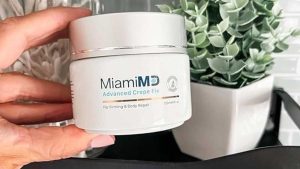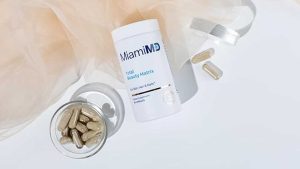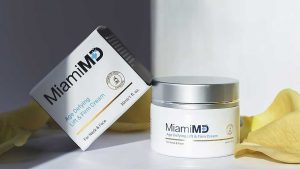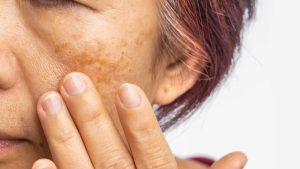Skin Inflammation: What You Should Know

One of the most common triggers of many of the issues that can impact your appearance (and, consequently, your self-esteem) is skin inflammation. It also happens to be one of the most complicated.
At MiamiMD, we believe that knowledge is power. With that in mind, we want to make sure that you have all the information you need to gain a little more understanding of what it is and why it happens.
Whether you’re dealing with skin inflammation, have had issues with it in the past, or are just curious about its main triggers (and the impact it can have on your appearance), we’ve compiled everything you need in one convenient place.
What Is Skin Inflammation?
Although the basic idea of skin inflammation may sound simple, it’s far more complicated and complex than it sounds!
At its core, skin inflammation is an outside sign that the body’s immune system has kicked into gear. In most situations, the inflammation impacts only a small, shallow area of skin. In other cases, it may travel deeper into the underlying layers of the skin.
Although the symptoms of skin inflammation can be irritating and uncomfortable, it is usually a sign that your body is doing what it was designed to do. They occur because the inflammatory response mounted by the body causes chemicals and substances, known as histamines, to be released. The skin, and the body as a whole, use those histamines to attract the “invaders.”
A side effect of exposure to those histamines is that the blood vessels widen. With more blood pumping through your skin also comes increased redness and warmth, which are two of the significant symptoms of inflammation of the skin.
What Are the Symptoms of Skin Inflammation?
The way you experience skin inflammation depends on your unique skin, but that doesn’t mean that there aren’t more commonly experienced symptoms. These often come down to the type of irritant causing the problems and whether you are dealing with acute inflammation or chronic inflammation.
In general, if you notice any of the following, you may be dealing with some type of inflammation and should seek a diagnosis by a dermatologist or other medical professional:
-Redness of the skin
-Skin that feels warm to the touch
-Itching
-Noticeable sensitivity (especially if that is new for you)
-Blisters
-Swelling
-Burning
-Scaly patches, often on your elbows
-Blemishes
-Thickened areas of skin
-Raw, cracked areas that can bleed or ooze
-Dandruff
-Hives
When you deal with inflammatory skin conditions, you may have only one of the above symptoms, or you may have them all. Pay attention to where your symptoms happen and if it seems to be a large area or smaller clusters.
What Triggers Skin Inflammation?
Just like the symptoms of skin inflammation can vary from person to person, so can its triggers. They can also be acute (meaning happening only once or randomly) or chronic (a persistent, recurring problem).
Potential Acute Skin Inflammation Triggers
Acute triggers of skin inflammation are often issues like skin infections. Most occur when bacteria or a foreign body (like allergens) enter the skin. That can happen through a cut or wound and through the pores in the skin (Propionibacterium acnes, or P. acnes, is a good example).
The risk of developing a skin infection leading to skin inflammation increases if you have other “comorbid” conditions like diabetes or poor circulation. Other common skin infections that trigger inflammation include shingles, staphylococcal (staph), and athlete’s foot.
Potential Chronic Skin Inflammation Triggers
Chronic triggers, on the other hand, are usually more significant, systemic issues. Autoimmune conditions like psoriasis can cause skin inflammation all over the body. With autoimmune diseases, the body views healthy cells as the “enemy” and attacks them as invading cells and bacteria.
People with chronic issues may start to notice the skin inflammation before other symptoms occur. That can be especially true with conditions like lupus (with its telltale “butterfly” rash) and celiac disease (dermatitis herpetiformis).
Other Potential Triggers
Not every trigger of skin inflammation is an infection or systemic issue. Allergies can be just as likely to set off inflammation, either from the outside or the inside (or both).
Allergen-based triggers can lead to a type of skin inflammation known as contact dermatitis. Contact dermatitis happens when you physically come into contact with an allergen.
Many people think eczema is a skin condition, but it is actually an allergic reaction to something in your environment. It’s also referred to as atopic dermatitis, and it is a widespread issue that people struggle with (more so in children than adults).
Your skin may also react to the temperature outside or even direct sunlight.
While some people are physically allergic to sunlight, it’s more likely that ultraviolet radiation triggers sensitive skin into overreacting. That overreaction can show up in the form of photosensitivity, sun damage, or heat rash.
The susceptibility to skin inflammation may even be related to a genetic predisposition.
Is There A Cure For Skin Inflammation?
Because skin inflammation is a symptom and not the actual disease, treating it comes down to finding the root cause.
If you’re noticing skin inflammation, schedule an appointment with your doctor to get it evaluated. If you need any medication, it will need to be treated by a licensed professional. They can also help you find ways to help prevent flare-ups, especially if you’re dealing with a chronic issue.
That doesn’t mean that there isn’t a way for you to soothe your skin at home, though. If you frequently experience skin inflammation on your face, you want to redesign your skincare routine in a way that supports it without being too harsh.
Start by taking a look at your current routine, and see if you’re able to figure out if any of them seem to be explicitly causing an issue. You may be allergic to a specific ingredient in one of your products, or you may just have a different skin type than your current routine supports.
Supportive Skin Care Products
When choosing supportive skincare products, knowing the right ingredients to look for can make a significant difference. Every element in a skincare product has the potential to cause a reaction, though, so make sure that you follow a patch test before applying it all over your face, especially if you haven’t used it before.
One of the best ingredients for skin inflammation will likely not surprise you — aloe vera.
For decades, aloe vera has been the go-to ingredient to help soothe sunburns. So much so, in fact, that it has gotten pigeonholed into people thinking that’s all it can do. That couldn’t be further from the truth, though!
When used topically, aloe vera can help soothe the skin and even potentially improve the symptoms of acne. Many skincare companies add aloe vera to their serums or other skincare products for that reason. If your skin seems to be excessively inflamed and irritated, you can also look for products that have corticosteroids in them.
A good example is a moisturizer that has hydrocortisone in it.
Hydrocortisone is naturally great for relieving itching, which is why people often turn to it first when it comes to treating poison ivy. When combined with other supportive skincare ingredients, like hyaluronic acid, it can soothe the skin and give it the moisture needed to function its best.
The skin is an incredibly complex organ, and it needs the right tools to perform at its optimal level.
When an ER Trip May Be Necessary
While your doctor should check out any new signs of skin inflammation, there are a few red flags that should trigger a trip to the emergency room. These include:
-Rapid heart rate
-Dizziness or fainting
-Swelling in the face and throat
-Fever
-Severe itching
-Extensive hives
Skin inflammation may sometimes just start a whole allergic reaction, which can be very dangerous if not treated quickly. Don’t dismiss new symptoms, and don’t put off treatment to see if it will go away if you have any of the symptoms above.
In Summary
When it comes to skin inflammation, figuring out the root cause is crucial. This issue can happen for a variety of reasons, but the truth is, all of them can wreak havoc not only on your appearance but also on how you feel about yourself. And life is hard enough!
MiamiMD wants to help you feel as comfortable as possible in your skin, no matter how it appears. Having a little information at your disposal if issues happen can make what may seem like an emergency into something you feel confident handling.
Sources:





